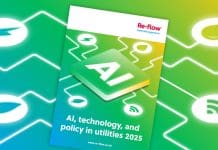A new survey by IFS found that the UK construction industry is keen to embrace AI but faces several challenges in being ready for adoption. Kenny Ingram, VP for construction and engineering, looks at how to overcome the barriers to fully realising the huge potential of AI in UK construction
The UK construction industry faces ongoing uncertainty. Economic pressures, global tensions and political volatility contribute to a challenging environment.
However, like many industries, it faces the need to modernise and adapt to emerging technologies to maintain its competitive edge. Artificial intelligence (AI), in particular, offers vast potential for transforming construction processes, enhancing efficiency and driving innovation.
The enthusiasm within the UK construction sector for AI is palpable. Recent research commissioned by IFS reveals that more than three-quarters (76%) of senior construction and engineering decision-makers at large firms say their organisations hold high expectations for AI.
Additionally, over two-thirds (68%) believe their industry is adopting AI at a faster pace than others. This optimism is driven by the recognition that AI can significantly enhance market knowledge, drive product and service innovation and support consistent business growth.
Streamlined projects, reduced waste and lower costs
The opportunities AI presents to the construction industry are many and diverse.
AI can streamline project management, improve safety protocols, optimise supply chain logistics and enhance predictive maintenance.
By analysing vast amounts of data, AI can provide insights that lead to more informed decision-making and better project outcomes.
For instance, AI algorithms can predict potential project delays, allowing for pre-emptive action and improved scheduling.
At the same time, AI-driven design tools can create more efficient building plans, reducing material waste and costs.
What is holding back AI in UK construction?
Despite the clear advantages, the construction sector faces significant challenges in fully leveraging AI.
While 76% of leaders report a high level of architectural readiness for AI adoption, there are notable concerns about the quality of AI resources, particularly human skills.
Over a third (36%) of respondents rate the quality of AI skills in their business as merely passable, highlighting a gap between the industry’s aspirations and its current capabilities.
This skills gap is further exacerbated by the fact that more than a quarter (27%) of firms do not prioritise upskilling, which is crucial for effective AI implementation.
The journey toward AI integration varies across the industry.
While 36% of firms have developed clear strategies and are reaping tangible benefits from their AI initiatives, 31% are still in the proposal-gathering stage for pilot projects.
Meanwhile, another 31% are in the research phase, reflecting a cautious yet determined effort to understand AI’s implications fully. This disparity indicates that while some companies are forging ahead, others are still laying the groundwork for future AI adoption.
Several obstacles are hindering the widespread adoption of AI in the construction and engineering sector.
A significant barrier is the legacy technology landscape, with 42% of respondents identifying it as a factor slowing their progress. This reliance on outdated systems makes it challenging to integrate new AI technologies seamlessly.
Additionally, 41% of respondents expressed uncertainty about potential AI use cases within their business, underlining the need for clearer strategic direction and better understanding of AI’s applications.
Breaking down the barriers
Overcoming these challenges is paramount for the construction industry to fully benefit from AI.
A strategic approach that includes investment in the right resources, particularly in upskilling the workforce, is essential.
Building a robust AI infrastructure that can support new technologies while phasing out legacy systems will also be critical. Companies need to foster a culture of innovation and continuous learning to keep pace with the rapid advancements in AI.
The benefits of successfully integrating AI into UK construction are substantial. Firms that effectively leverage AI can expect enhanced efficiency, reduced costs, improved safety and greater innovation.
AI can lead to smarter project management, with real-time data analysis allowing for better resource allocation and risk management.
Safety is another area where AI can make a significant impact, with predictive analytics helping to identify and mitigate potential hazards before they occur.
Furthermore, AI-driven innovation can open up new business opportunities and revenue streams, positioning companies at the forefront of the industry.
While the UK construction sector is eager to embrace AI, it must address several challenges to fully realise its potential.
By prioritising upskilling, modernising technology infrastructure and developing clear AI strategies, the industry can overcome these obstacles.
The rewards for doing so are clear: a more efficient, innovative and competitive construction sector that is well positioned to meet the demands of both the present and the future.














